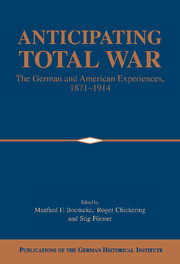Introduction
Published online by Cambridge University Press: 05 January 2013
Summary
The chapters in this book were the focus of deliberations at a conference that convened in Augsburg in July 1994. This meeting was the second in a projected series of five conferences on “The United States and Germany in the Age of Total War, 1860-1945.” The design of the series is to survey the effects of new forms of warfare - and the new requirements of preparing for them - on these two countries, whose social structures, political institutions, and cultural traditions displayed significant differences during the period in question. The object is accordingly a comparative analysis of war and society - to study the massive impact of changes in technology and social organization on the conduct of war, as well as the impact of warfare on broader social, political, and cultural developments in the two lands.
The first conference in the series met in Washington, D.C., in April 1992, to examine the American Civil War and the midcentury wars of German unification in this light. Here the deliberations laid bare the difficulties of comparison, for these campaigns appeared to have little in common beyond their contemporaneity. The German wars proceeded with a dispatch that not only kept the German casualty figures low but also limited the dislocations visited by mobilization on the home front, if one can even speak of a German “home front” during these conflicts. The American war, by contrast, provided many more plausible anticipations of the comprehensive kind of warfare that became known in the next century as “total war.” It was far longer, more extensive geographically, and more costly, and it involved civilians directly to a far greater degree as providers of moral and material support to the soldiers and as immediate victims of military operations.
- Type
- Chapter
- Information
- Anticipating Total WarThe German and American Experiences, 1871–1914, pp. 1 - 10Publisher: Cambridge University PressPrint publication year: 1999



